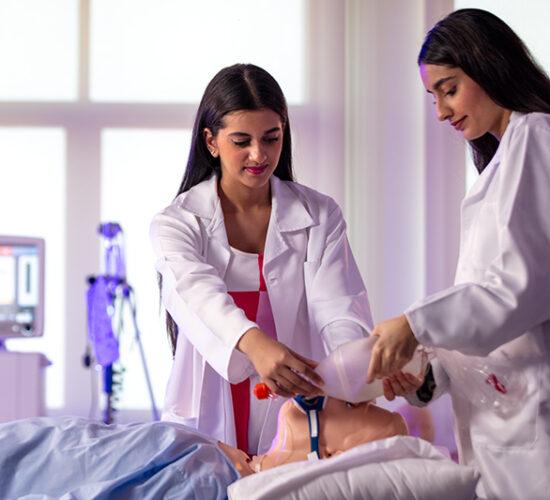| Program Title: | Bachelor of Science in Respiratory Care |
|---|---|
| Credit Hours: | 163 |
| Award Granted on Completion: | Bachelor of Science in Respiratory Care |
| Delivery Mode: | Face-To-Face |
| Local Accreditation Status: | Commission for Academic Accreditation, UAE (CAA) |
| Language of Study: | English |
| Duration: | 5 Years |
| Campus: | Abu Dhabi |
| Faculty Info: | Faculty of Medical and Health Sciences |
About the Program
The Bachelor of Science in Respiratory Care will prepare you to work in the hospital and healthcare industry as a Respiratory Care Specialist, Respiratory Therapist, or Respiratory Care Practitioner, caring for patients suffering from respiratory disorders. You will gain the knowledge and skills to deal competently with critically ill ICU patients and in advanced diagnostics and rehabilitation.
The program is supported by simulation labs equipped with high-fidelity ICU and trauma manikins, invasive and non-invasive ventilators, and task trainers for various procedures such as airway management, vascular access, etc. As well as clinical knowledge and skills, the program provides the capabilities required to become a researcher and leader in specific areas of interest.
The program has four clinical practice courses and an internship as part of clinical exposure. These courses enable you to gain the required respiratory care skills, reinforce the knowledge of theory modules through real clinical case scenarios, and develop a high level of professionalism through exposure to healthcare settings.
Objectives
Learning Outcomes
After completing the Bachelor of Science in Respiratory Care, numerous career opportunities are available to you. Here are some of the types of organizations previous graduates of the program have secured the position:
General Requirements – 11 Courses (33 CHs)
| Course Code | Course Title | Credit Hours | Prerequisite |
|---|---|---|---|
| CIT 100 | Introduction to Information Technology | 3 | None |
| ENG 100 | English I | 3 | None |
|
GEN100/ GEN101 |
Communication Skills in Arabic/ Communication Skills in Arabic for non-Arabic speakers | 3 | None |
| GEN 102 | Islamic Culture (Arabic/English) | 3 | None |
| GEN 105 | Emirates Culture and Society | 3 | None |
| ENG104 | English II | 3 | ENG 100 |
| GEN 103 | Logic and Critical Thinking | 3 | ENG 100 |
| GEN 201 | Psychology | 3 | ENG 100 |
| GEN 302 | Fundamentals of Innovation and Entrepreneurship | 3 | ENG 100 |
| GEN 304 | Ethics | 3 | ENG 100 |
| MTH 105 | Mathematics and Statistics | 3 | None |
Basic Medical Science Courses- 6 Courses (18 CHs)
| Course Code | Course Title | Credit Hours | Prerequisite |
|---|---|---|---|
| BMS 110 | Medical Terminology | 3 | |
| BMS 121 | Human Anatomy | 3 | BMS 110 |
| BMS 122 | Human Physiology | 3 | BMS 110 |
| BMS 123 | Introduction to Microbiology | 3 | |
| BMS 410 | Pathology | 3 | |
| BMS 411 | General Pharmacology and Toxicology | 3 |
Basic Science Courses- 6 Courses (18 CHs)
| Course Code | Course Title | Credit Hours | Prerequisite |
|---|---|---|---|
| BSC 110 | Introduction to Science | 3 | |
| BSC 120 | Physics for Health Sciences | 3 | |
| BSC 121 | Chemistry for Health Sciences | 3 | |
| BSC 122 | Biology for Health Sciences | 3 | |
| BSC 220 | Biostatistics | 3 | |
| BUS 307 | Research Methods | 3 | BSC 220 |
Core Major Courses- 26 Courses (94 CHs)
| Course Code | Course Title | Credit Hours | Prerequisite |
|---|---|---|---|
| RCM 220 | Cardiopulmonary Anatomy and Physiology | 3 | BMS 121, BMS 122 |
| RCM 221 | Introduction to Respiratory Care Profession | 2 | BMS 121, BMS 122 |
| RCM 310 | Respiratory Care Science I | 4 |
BMS 121, BMS 122 CR: RCM 220, RCM311 |
| RCM 311 | Patient Assessment | 4 | RCM 220 |
| RCM 320 | Cardiopulmonary Diseases I | 3 | RCM 220 + BMS 410 |
| RCM 321 | Fundamental of Polysomnography | 3 | RCM 220 |
| RCM 322 | Mechanical Ventilation I | 3 | RCM 310 + RCM 311 |
| RCM 323 | Respiratory Care Science II | 3 | RCM 310 + RCM 311 |
| RCM 324 | Respiratory Care Clinical Practice I | 3 | RCM 310 + RCM 311 |
| HCM 323 | Quality Management in Healthcare | 3 | |
| HIM 423 | Introduction to Healthcare Informatics | 3 | |
| RCM 410 | Mechanical Ventilation II | 4 |
RCM 322, RCM 320, RCM 323 |
| RCM 411 | Respiratory Care Clinical Practice II | 3 | RCM 324, RCM 323 |
| RCM 412 | Patient Care Management Seminar | 2 |
RCM 320, RCM 322 RCM 323 |
| RCM 413 | Cardiopulmonary Diseases II | 3 | RCM 320, RCM 411 |
| RCM 414 | Pulmonary Function Diagnostics | 3 | RCM 220 + RCM 320 |
| RCM 420 | Multidisciplinary Respiratory Care | 3 |
RCM 410, RCM 323 RCM 413 |
| RCM 421 | Pulmonary Rehabilitation/ Home Care | 3 | RCM 413 |
| RCM 422 | Pediatric Respiratory Care | 3 | RCM 410, RCM 323 |
| RCM 423 | Respiratory Care Clinical Practice III | 8 | RCM 411 |
| RCM 424 | Neonatal Respiratory Care | 3 | RCM 410, RCM 323, RCM 422 |
| RCM 510 | Clinical Simulation Seminar | 2 | RCM 420, RCM 422 |
| RCM 511 | Essentials of Critical Care | 2 | RCM 420 |
| RCM 512 | Respiratory Care Seminar | 2 | RCM 422, RCM 420 |
| RCM 513 | Graduation Project | 3 | RCM 420, BSC 320 |
| RCM 520 | Respiratory Care Clinical Practice IV | 16 | RCM 423, RCM 511 |
| Semester 1 | CH | Semester 2 | CH | ||
| YEAR 1 (36 CH) | |||||
|---|---|---|---|---|---|
| ENG 100 | English I | 3 | GEN 105 | Emirates Culture and Society | 3 |
| BMS 110 | Medical Terminology | 3 | BSC 120 | Physics for Health Sciences | 3 |
| BSC 110 | Introduction to Science | 3 | BSC 121 | Chemistry for Health Sciences | 3 |
| CIT 100 | Introduction to Information Technology | 3 | BSC 122 | Biology for Health Sciences | 3 |
| MTH105 | Mathematics & Statistics | 3 | BMS 121 | Human Anatomy | 3 |
|
GEN 100/ GEN 101 |
Communication Skills in Arabic/ Communication Skills in Arabic for non-Arabic speakers | 3 | BMS 122 | Human Physiology | 3 |
| Total | 18 | Total | 18 | ||
| YEAR 2 (32 CH) | |||||
| BSC 220 | Biostatistics | 3 | GEN 103 | Logic and Critical Thinking | 3 |
| ENG 104 | English II | 3 | RCM 220 | Cardiopulmonary Anatomy and Physiology | 3 |
| GEN 102 | Islamic Culture (Arabic/English) | 3 | BMS 411 | General Pharmacology and Toxicology | 3 |
| GEN304 | Ethics | 3 | BUS 307 | Research Methods | 3 |
| BMS 123 | Introduction to Microbiology | 3 | GEN 201 | Psychology | 3 |
| RCM 211 | Introduction to Respiratory Care Profession | 2 | |||
| Total | 17 | Total | 15 | ||
| YEAR 3 (32 CH) | |||||
| GEN 302 | Fundamentals of Innovation Entrepreneurship and Sustainability | 3 | RCM 320 | Cardiopulmonary Diseases I | 3 |
| BMS 410 | Pathology | 3 | RCM 321 | Fundamental of Polysomnography | 3 |
| RCM 310 | Respiratory Care Science I | 4 | RCM 322 | Mechanical Ventilation I | 3 |
| RCM 311 | Patient Assessment | 4 | RCM 323 | Respiratory Care Science II | 3 |
| HCM 323 | Quality Management in Healthcare | 3 | RCM 324 | Respiratory Care Clinical Practice I | 3 |
| Total | 17 | Total | 15 | ||
| YEAR 4 (35 CH) | |||||
| RCM 410 | Mechanical Ventilation II | 4 | RCM 420 | Multidisciplinary Respiratory Care | 3 |
| RCM 411 | Respiratory Care Clinical Practice II | 3 | RCM 421 | Pulmonary Rehabilitation/ Home Care | 3 |
| RCM 412 | Patient Care Management Seminar | 2 | RCM 422 | Pediatric Respiratory Care | 3 |
| RCM 413 | Cardiopulmonary Diseases II | 3 | RCM 423 | Respiratory Care Clinical Practice III | 8 |
| RCM 414 | Pulmonary Function Diagnostics | 3 | RCM 424 | Neonatal Respiratory Care | 3 |
| Total | 15 | Total | 20 | ||
| YEAR 5 (28 CH) | |||||
| RCM 510 | Clinical Simulation Seminar | 2 | RCM 520 | Respiratory Care Clinical Practice IV | 16 |
| HIM 423 | Introduction to Healthcare Informatics | 3 | |||
| RCM 511 | Essentials of Critical Care | 2 | |||
| RCM 512 | Respiratory Care Seminar | 2 | |||
| RCM 513 | Graduation Project | 3 | |||
| Total | 12 | Total | 16 | ||
Liwa College offers Bachelor’s programs that are accredited by the Ministry of Education in the UAE and are designed in collaboration with our strategic partners across all industries. Our curricula as well as teaching and learning methods follow a practical approach whereby students get to test theories and develop skills that bridge the gap between academia and the labor market needs.
The College sets out clear and consistent information about its fees and financial policies. The Policy is established in compliance with the requirements of the Commission for Academic Accreditation (CAA) and relevant Directives of the Ministry of Education (MOE).
Join with Many Students Select the program you want to Enquire About!

